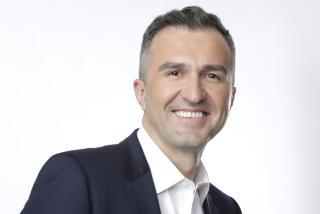Visionary, Showman Helped Usher In a New Era
- Share via
Word of Roone Arledge’s death came Thursday as the news division he built was basking in its latest ratings coup -- Diane Sawyer’s exclusive interview the night before, filled with talk of drug use and marital discord, with singer Whitney Houston.
Arledge, the pioneering president of ABC News and ABC Sports, as much as anyone helped define and shape modern broadcast news and sports coverage for both better and worse -- championing stylistic innovations that fundamentally changed how such programs are presented, sometimes at the expense of content.
“If you think about news in our time, it’s just synonymous with Roone Arledge,” Barbara Walters said in a statement posted on ABC’s Web site.
This is undoubtedly the case. Yet his passing also comes at a time when the generation that first dared blur news and entertainment, which led television from black and white into color, has been marginalized by a consolidated media industry that leaves less room for maverick executives and firebrand producers.
Recent developments betray this corporate influence, and the diminution of the old guard. Don Hewitt -- the producer patriarch behind “60 Minutes,” a week shy of his 80th birthday -- has been making noise about being elbowed out by CBS (a contention the network has denied).
ABC News, under the stewardship of the Walt Disney Co., has been in ongoing talks with AOL Time Warner about merging its news operations with cable network CNN as a cost-cutting maneuver.
Disney also flirted with David Letterman, seeking to woo the CBS late-night host away last spring. That move would have probably spelled the end for “Nightline,” the prestigious late-night broadcast established under Arledge. ABC News President David Westin was said to have been ambushed when news of Letterman’s courtship surfaced, something people couldn’t imagine happening on Arledge’s watch.
Each of these episodes underlines the fact that broadcast news, as a small part of companies like Disney, CBS owner Viacom, General Electric’s NBC and Fox parent News Corp., has become just another consumer product. News divisions can serve a higher purpose -- as the networks admirably demonstrated on Sept. 11 -- but cannot ignore the bottom line.
In this context, referring to legendary CBS newsmen Edward R. Murrow and Walter Cronkite in a discussion of broadcast news -- as Hewitt did during a recent “Larry King Live” interview -- is tantamount to citing a Shakespeare play in connection with one of “The Matrix” sequels. Yes, both are dramas, but given the altered storytelling approach and business model, most similarities basically end there.
Arledge, Hewitt and their contemporaries recognized the relationship between news and entertainment, finding a way to turn TV newsmagazines -- driven by star anchors and spiced by marketable subject matter -- into profit centers.
Still, it’s doubtful when “20/20” premiered almost a quarter-century ago how many excesses foreshadowed by the 1976 movie “Network” would eventually come true, from wholesale use of news as a promotional vehicle to the transformation of news personnel into entertainers.
Consider Anderson Cooper, who went from news correspondent to ABC’s unscripted program “The Mole,” then back to news at CNN. CBS News’ Julie Chen hosts the network’s prime-time show “Big Brother.” Meredith Vieira left “60 Minutes” for daytime’s “The View,” and this fall added quiz-show host to her resume, on “Who Wants to Be a Millionaire.”
Arledge was, by any measure, a visionary, someone who inspired loyalty among his troops and knew how to rile competitors. Foremost, he was a showman, able to impress various constituencies, from the network’s affiliated stations to advertisers. Tellingly, Westin, who succeeded him as president of ABC News, was ABC’s former legal counsel. He’s considered an intelligent but low-key executive, the sort who doesn’t cast the same larger-than-life shadow -- or provoke the kind of apprehension -- that might have caused his employers to think twice before risking their financially driven pursuit of Letterman.
Then again, in the modern world of television, it’s generally wise to fit inside the box.
More to Read
The biggest entertainment stories
Get our big stories about Hollywood, film, television, music, arts, culture and more right in your inbox as soon as they publish.
You may occasionally receive promotional content from the Los Angeles Times.










